Confined Space Training
Confined Space Initial - 1 day
A course for those in operational roles undertaking work in confined spaces (enclosed or partially enclosed) to carry out work or inspections.
Confined Space Intermediate - 2 days
An advanced course for those in operational roles, undertaking work in confined spaces (enclosed or partially enclosed) to carry out work or inspections. Includes comprehensive training in gas detection, breathing apparatus and setting up fall arrest and rescue equipment.
Confined Space Advanced - 3 days
This program involves the Initial & Intermediate course plus it covers rescue in more complex confined space environments as a team member or a member of a single agency. The application of this unit in the workplace covers a range of confined space rescue situations and rescue by personnel from the organisation where confined space work is undertaken. This course is recommended for standby and safety observers. MSMWHS216 -Operate breathing apparatus & HLTAID009 –Perform cardiopulmonary resuscitation have an annual recertification period.
Confined Space Refresher - 8 hrs
A comprehensive refresher course for all those working in confined spaces, including those performing sentry or stand-by person roles with emergency rescue team backup.
Associated Training
Gas Test Atmospheres - 1/2 day
A course for people testing the working atmosphere of a confined space to determine if it safe for the proposed work. The course covers the use of electronic test apparatus and being able to interpret readings and take actions based on the interpretation.
Operate Breathing Apparatus - 1/2 day
A course for operators who are required to wear breathing apparatus for part of their job.
Issue Work Permits - 1/2 day
A course to ensure that staff responsible for issuing permits have the required knowledge and skills to do so. This person may be responsible for site works teams and contractors working in their area of responsibility. This person may/but may not be involved in the actual work to be performed, but must have a good understanding of the work and be able to complete an appropriate risk assessment.
CONFINED SPACE SENTRY/STANDBY-2 DAY
This course covers the skills and knowledge required to undertake the safety observer role for working under a confined space permit. This role may also be called a hole watcher. a fire watcher or sentry.
Available Training
- ➤ Training Overview
- ➤ Confined Space Training
- ➤ Working at Heights Training
- ➤ Fire Fighting Training
- ➤ Emergency Response Training
- ➤ Elevated Work Platform
- ➤ First Aid Training
- ➤ Elec. Transmission, Distribution & Rail
- ➤ Work Health Safety Training
- ➤ On-site Training
- ➤ Training FAQs
- ⬇️ Download the Training Handbook
What our customers say
Our Certifications
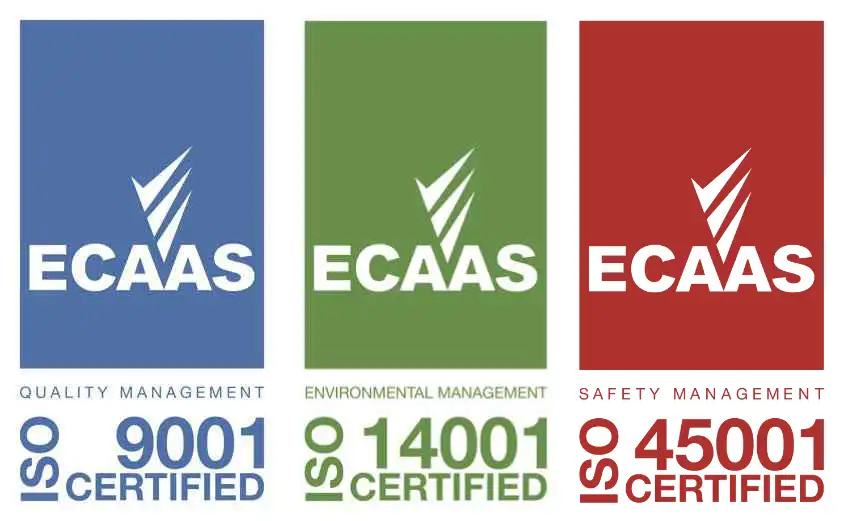
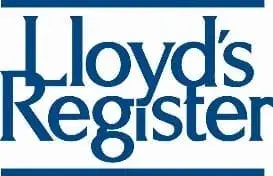
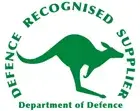
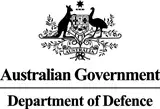

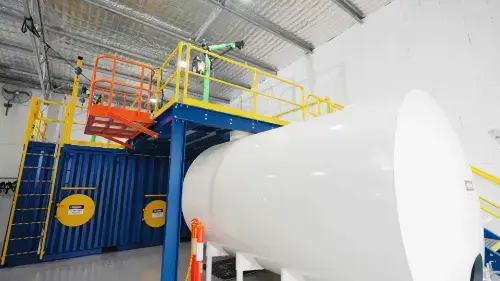
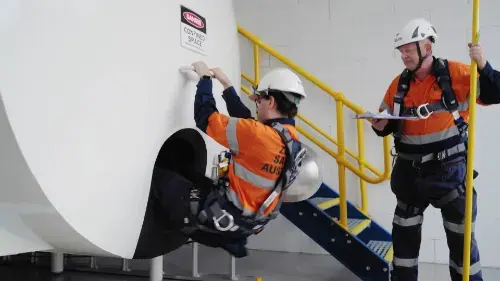

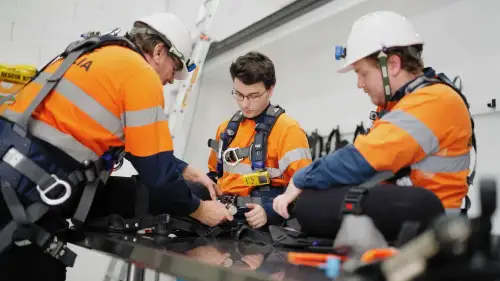
Defining a Confined Space
Confined spaces are usually found in the holds of container vessels, in pressure vessels or in underground sewers or tunnels. They are also in tanks, pits, vats, pipes, containers, chimneys, ducts, flues, silos. They can also be in wet or dry wells, shafts, trenches, tunnels. Any enclosed or partially enclosed structures.
The definition of a confined space is an enclosed or partially enclosed space that is
- Not designed or intended to be occupied by humans.
- At normal atmospheric pressure—or is designed or intended to be at normal atmospheric pressure—while a person is in the space.
- Is a risk to health and safety because it contains:
- An atmosphere without a safe oxygen level.
- Contaminants like airborne gases, vapours and dust that is harmful to humans.
- Is at risk of engulfment, or contains gasses that could ignite.
A Confined Space is also an enclosed or partially enclosed space space that is normally safe, but could become contaminated through work carried out in the space generating harmful concentrations of airborne contaminants.
Whenever possible, the need for people to enter a confined space should be eliminated, but repairs and maintenance often can’t be done without somebody entering the space. Entry to a confined space is when a person’s head or upper body enters the space and before this happens, you should be aware of your safety obligations.
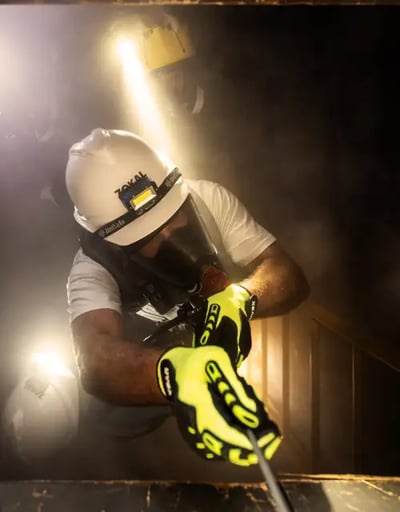
Confined space training is essential for people working in Construction, Mining, Shipping, Defence, Rural and Government sectors. It is a basic requirement for people in any workplace that are required to enter a confined space.
A lack of confined space entry programs, result in the deaths or injuries of a large number of workers every year.
Tragically, many of these deaths are people trying to rescue their unconscious workmates who have collapsed, without proper training or equipment.
Confined Space training is required by law. It saves lives and protects your organisation from the chance of litigation.
Confined Space Training FAQs
What is confined space training?
Confined space training equips workers with the skills to identify hazards, use equipment, and follow procedures for entering and working in confined spaces—defined as enclosed areas with limited entry/exit and risks like oxygen deficiency, toxic gases, or engulfment.
Nationally accredited courses align with units like RIIWHS202E (Enter and Work in Confined Spaces) under the Australian Qualifications Framework (AQF). It's mandatory for anyone entering such spaces per the Safe Work Australia Model Code of Practice for Confined Spaces.
Who Needs Confined Space Training in Australia?
Anyone who enters or works in confined spaces, including supervisors, stand-by personnel, and rescuers, must be trained. This includes roles in mining, oil and gas, water treatment, and construction.
Employers must assess risks via a confined space hazard identification process and provide training based on workplace needs. Even spotters or those issuing permits require it.
Per the Safe Work Australia Model WHS Regulations (Section 68), employers must ensure workers are trained in confined space risks relevant to their duties. This includes risk assessments, emergency plans, and signage. Non-compliance can lead to fines up to $300,000 for corporations. States like NSW and VIC enforce via SafeWork agencies, requiring competency-based assessments.
What qualifications do you need to work in a confined space?
To legally work in a confined space in Australia, workers must hold a Statement of Attainment for the relevant nationally recognised units such as:
- RIIWHS202E – Enter and work in confined spaces
- MSMWHS217 – Gas test atmospheres
- PUASAR025 – Undertake confined space rescue (for standby or rescue personnel)
How long does confined space training take?
Initial courses usually last 1 day (8 hours) for basic training, including theory, practical exercises, and assessment.
More comprehensive or advanced courses may extend to 2 days. Some blended options combine 8 hours face-to-face with self-paced online modules.
Refresher courses are shorter: 4 hours to 1 day.
How often do you need to refresh training to remain certified
Confined space training does not expire with a fixed timeline under SafeWork Australia regulations.
Instead, refresher training frequency depends on workplace risk assessments—provide it when skills may have declined, such as after 2 years or if workers rarely enter spaces.
Many providers and industry guidelines recommend refreshers every 2 years to maintain competency and comply with record-keeping requirements (e.g., SafeWork NSW mandates records for at least 2 years).
High-risk sites may require annual refreshers.
What is the cost of confined space training in Australia?
Expect to pay $150–$300 for a standard 1-day initial course, depending on location, provider, and inclusions (e.g., equipment hire).
Two-day advanced courses range from $300–$600. Refresher training costs $110–$295 for half-day to 1-day sessions.
Prices may vary by state—e.g., slightly higher in metro areas like Sydney or Melbourne—and group bookings often offer discounts. Always check for GST inclusion and certification fees.
Who needs confined space training?
- Construction and mining workers
- Maintenance personnel
- Utility and sewer workers
- Safety officers and emergency responders
- Engineers or inspectors entering tanks or pits
Zokal Confined Space Training FAQs
Why choose Zokal for confined space training?
Zokal Safety Training offers the most advanced confined space training facilities in Australia, equipped with cutting-edge, immaculately maintained gear and purpose-built simulation environments that replicate real-world conditions.
Where is Zokal’s confined space training conducted?
Training is conducted at Zokal’s dedicated training centre at Friesian Business Centre, 5 Friesian Close, SANDGATE, NSW 2304, NSW. It is designed to offer immersive, hands-on experience in controlled, safe conditions. On-site training is also available for large teams.
Is Zokal’s confined space training nationally recognised?
Yes. All Zokal courses meet Australian WHS standards and result in a nationally recognised Statement of Attainment upon successful completion.
How experienced are Zokal’s trainers?
Zokal’s trainers are highly competent industry professionals with real-world experience in mining, rescue, and industrial operations. They focus on not just compliance, but also practical, life-saving techniques.
How does Zokal maintain such high training standards?
Zokal uses only new and meticulously maintained safety gear, ensuring that trainees work with equipment identical to what they’ll use in the field. Their facilities are regularly updated to reflect current industry practices and risks.
What do others say about Zokal's confined space training?
With over 390 5-star reviews on Google, Zokal is one of Australia’s most trusted safety training providers. Clients consistently praise the professionalism, quality of instruction, and real-world relevance of their training programs.
Can Zokal provide confined space rescue training too?
How can I book confined space training with Zokal?
You can book through the calendar or contact our training team on: (02) 4960 9611 for group bookings and customised onsite programs. We also assist with ensuring your training aligns with your company’s WHS obligations.







